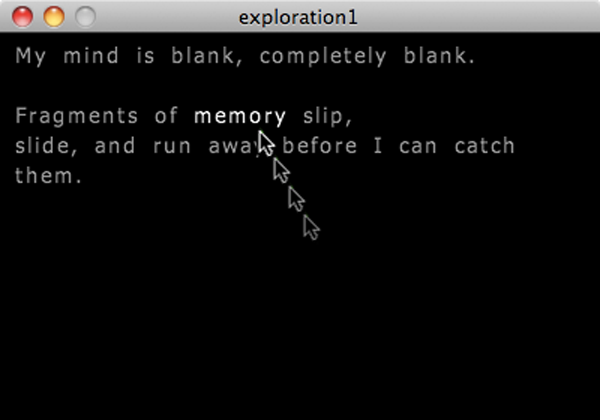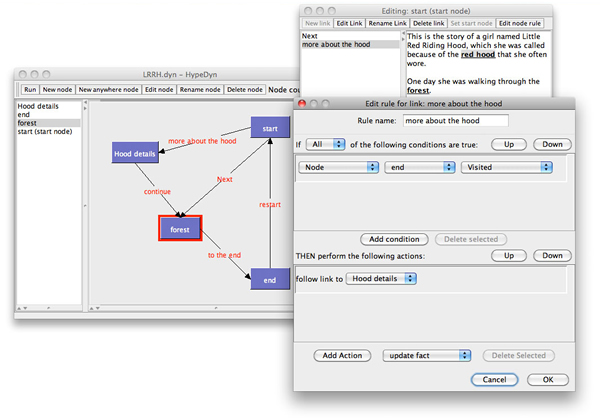Projects
Repeat Experience of Computational Systems
 This research explores people's motivations and satisfactions related to repeat experience of dynamic computational systems such as interactive stories and games.
This research explores people's motivations and satisfactions related to repeat experience of dynamic computational systems such as interactive stories and games.
Current Projects
Repeat Experience and System Understanding
This project explored the ways in which people make sense of systems such as artificial intelligence during repeat experience, and to what extent they gain an aesthetic experience from this process of sense-making.
Past Projects
Digital Wellbeing in Games
This project explored the reasons why people want to replay games, and how to help people be more aware of their continuation intention so as to empower people to actively choose whether or not they want to continue playing. This work was part of Zhu Zicheng's PhD thesis.
Understanding Repeat Engagement with Dynamic Computational Media
Much of the motivation to reexperience creative works such as films, novels, or music assumes that although the context of the experience may have changed, the actual work being revisited is still the same. However, when returning to a work where an underlying computational system dynamically alters the surface of the work as the result of the participant’s actions, there is no guarantee that the experience, or even the work itself, will be the same as in the previous encounter.
This project explores what motivates people to return to this type of work, what type of satisfaction can be gained by this repeat experience, and how the design of the formal elements of the work impact this experience. This work was carried out as part of the MOE AcRF Tier 1 grant Understanding Repeat Engagement with Dynamic Computational Media [details].
Dynamic Difficulty Adjustment and Player Experience
This project explores the impact of dynamic difficulty adjustment (DDA) on player experience in single-player video games. This work was part of Dennis Ang's PhD thesis.
Rereading in Interactive Storytelling
One measure of what makes a story good is whether or not people want to go back and reread the story. This research investigates what it means to reread a story in the context of stories that potentially change as the result of reader choice. This project was Alex Mitchell's PhD thesis work. [details]
Poetic Interactivity
 This work focuses on the ways that people respond to interactive works that involve stories, play and aesthetic response, and the ways that interactivity can be structured to create an aesthetic response. In particular, this looks at the impact of interactivity on storytelling in games.
This work focuses on the ways that people respond to interactive works that involve stories, play and aesthetic response, and the ways that interactivity can be structured to create an aesthetic response. In particular, this looks at the impact of interactivity on storytelling in games.
Current Projects
Designing for Poetic Gameplay
This research explores ways to support artists and designer of poetic, artistic or meaningful games and interactive stories through the representation of design knowledge, such as patterns.
Past Projects
Games and Narration
This research explores the role of the "narrator" in storygames, seeking to understand the ways in which games can tell stories, and how this relates to theories of the narrator in traditional narratology. This research was part of Roe Curie's MA thesis.
Extending Comics Theory to Interactive Comics
This research explores the addition of interactivity into comics impacts the way that comics work, and how this requires extensions to comics theory. This work was part of Tiffany Neo's PhD thesis.
Defamiliarization and Poetic Interactivity
This project explored the ways that the design of interactivity in games and interactive art can be used to create an aesthetic response in the user. The aim of the project was to investigate the various structural “devices”, equivalent to literary devices such as imagery, allusion, and choice of language, which can be used by designers of interactive media to “slow down” the process of perception while interacting with an interactive work, to create a poetic effect similar to the effect of poetic or literary language on a reader of a literary work.
The project has served to deepen our understanding of what it means for an interactive work such as a game to be considered “art”, approaching this from a neo-formalist perspective that draws on theory from a range of disciplines, including literature, film studies, and game studies. The neo-formalist aspects of the research were complemented by empirical studies that provide insight into player response to the techniques identified in the project, and a deeper understanding of how design knowledge about interactive artworks can be captured and communicated in the form of actionable theory.
This work was carried out as part of the MOE AcRF Tier 1 grant Exploring "Literary" Devices for Poetic Interactivity [details].
Anticipation as an Aesthetic Response in Interactive Art
This research examines the ways in which anticipation can be seen as an aesthetic response, and how this type of aesthetic response is manifest in the context of interactive art. This project was part of Jing Chiang's MA thesis. [details]
Subjective Experience in Interactive Life Storytelling
This work considers how a sense of the subjective life experience is transmitted to the reader/audience/interactor in life stories in different media, with a particular focus on interactive media. This project was part of Evelyn Chew's PhD thesis. [details]
Perceived Agency in Storytelling Games
This project aims to explore how this form of perceived agency can arise when players engage with storygames, which require the player’s understanding of both narrative elements, such as plot and characters, and the playable system in order to progress. In particular, this exploration focuses on the main vessels through which players make and orient their decision points – the characters that they control and meet. This work was part of Kway Liting's MA thesis. [details]
Wordless Narratives in Games
There is a long tradition of wordless storytelling, including forms such as childrens' picturebooks, wordless comics, and mime. This work explores how storytelling without verbal or written text takes place in games. This research was part of Sim Yuin Theng's MA thesis.
Tools for Storytelling
 People instinctively know how to tell stories: about themselves, their lives, and the world around them. Despite this, it is not easy to tell good stories. It is also not easy to tell stories in computational media, which requires awareness of how to make use of the affordances and limitations of this new medium. These projects all attempt to address, in various ways, the question of how to create tools that can help people to tell stories.
People instinctively know how to tell stories: about themselves, their lives, and the world around them. Despite this, it is not easy to tell good stories. It is also not easy to tell stories in computational media, which requires awareness of how to make use of the affordances and limitations of this new medium. These projects all attempt to address, in various ways, the question of how to create tools that can help people to tell stories.
Current Projects
Authoring Complex Storygames
Complex stories involve multiple relationships between characters, events and places, requiring effort on the part of the reader to untangle and make sense of these relationships. This project explored ways for authors to create this type of story where there is an equally complex, and equally important, underlying playable system.
Past Projects
Authoring for Interactive Storytelling
Authoring, its tools, processes, and design challenges remains a key issue for the Interactive Digital Narrative (IDN) research community. This workshop series explored the issues underlying the design of tools to support authoring for interactive storytelling. The workshop series was organized together with Ulrike Spierling (Hochschule RheinMain), Charlie Hargood (Bournemouth University), and David Millard (University of Southampton), and culminated in an edited volume, The Authoring Problem, published by Springer in 2023. [details]
HypeDyn: Authoring Tools for Procedural Hypertext Fiction
HypeDyn (pronounced "hyped in") is a procedural hypertext fiction authoring tool for people who want to create text-based interactive stories that adapt to reader choice. This work was originally developed as part of the Tools for Telling project under the Singapore-MIT GAMBIT Game Lab, and later continued as part of the FASS startup grant Authoring Paradigms and Representation in Interactive Storytelling Tools. [details]
Travel Teller: Telling Stories on the Go
This project explores ways to provide intelligent support for creativity and storytelling in the context of travel stories. This work was done together with the Keio-NUS CUTE Center. [details]
Kwento: Supporting Mediated Family Storytelling for Migrant Workers
The sharing of significant personal experiences, or 'family stories' remains an important part of what it means to be a family. This research explores ways in which a mobile storytelling app could help overseas domestic workers to capture personal experiences and stories to be shared, later, with their families back home. This project was part of Cheong Kakit's MA thesis. [details]
Supporting Collaborative Storytelling
The project investigated how computer mediation can enhance real-time performance. The first study explored the impact of providing a concrete representation during real-time creative collaboration, revealing a tension created by the time pressure introduced by a constantly moving temporal window. A second study explored alternative approaches to support real-time planning, suggesting even limited direct communication is helpful, but a tension remains between planning and improvisation. A third study explored how musicians communicate during improvisation, revealing how musicians use non-verbal and in-music cues. These results provide an important foundation for the design of systems to support real-time creative collaboration. This work was carried out under the NUS HSS Seed Fund grant Communication Strategies in Real-time Computer-mediated Creative Communication.
Storytelling Games: Encouraging Narrative Play
Storytelling games are a form of competitive storytelling framed in the context of gameplay. This research explored the design of storytelling games that balance storytelling and gameplay by encouraging narrative play.